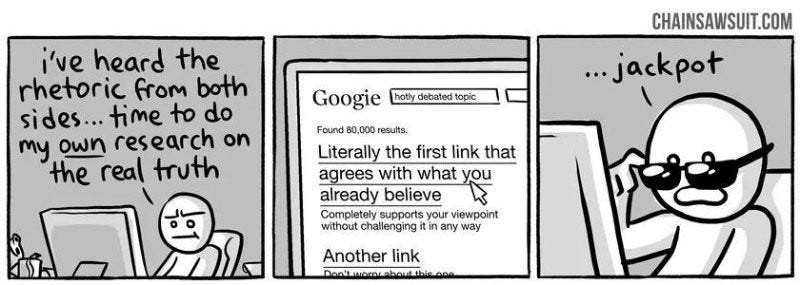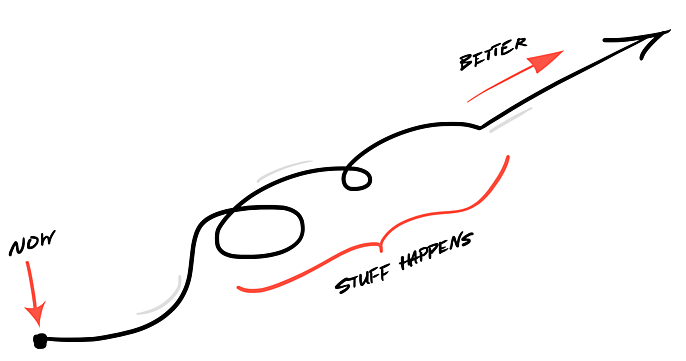Wealth From the Ground Up
Developing our financial literacy and getting better at it one decision at a time
Hey everyone, I’m Jeff and thanks for reading Second Generation — a (roughly) bi-weekly newsletter where I share my evolving thoughts on wealth from the perspective of a first-generation college graduate.
If you’re new to these, let me be the first to say welcome and thank you so much for subscribing! 🎉 I hope you enjoy the content, but if you don’t (or you just get too many emails) that’s cool too; feel free to unsubscribe at any point at the bottom of this email.
TL;DR
Talking about wealth in the abstract is a luxury that most of us can’t afford. Let’s ground ourselves a bit and talk about financial literacy.
Chances are, our schools or parents didn’t teach us this stuff. If you want to get a grasp of some financial literacy basics or learn more about the personal finance journeys of others, check out: NYT Post-Grad Survival Guide, Andrei Jikh and The Mad Fientist.
We all need to treat ourselves from time to time, but make sure you’re being intentional with your money. Get a birds-eye view of you finances using YouNeedABudget, The Personal Finance Flowchart, and Personal Capital.
Successful change won’t happen right away. All that matters is that you try to be better today than you were tomorrow. Try simplifying the process by recognizing the power of doing nothing and making the good decisions the easy ones.
Wealth, like financial literacy, can be thought of with respect to the past, present and future. Stay tuned for more issues on the Pillars of Wealth.
Wealth is Too Abstract 💭
The truth is, wealth is a hard concept to define. But even if we factor out the all the sociological complexities of class and the emotional difficulties of being a first-generation college graduate, the little things are harder than they have to be.
I can sit here comfortably in front of my computer and just pontificate about wealth — talk about what it means, why we need it to enact social change, or the tech industry's shortcomings in addressing inequality, but let’s be honest. These ideas alone don’t really help us get past the first step of managing our own finances.
So, today I want to ground ourselves a bit and talk about financial literacy. I want to focus on the here-and-now and start a conversation about how we can develop the skills that will enable us to make informed and effective decisions with our money.
Hit the Books 📚
To start, let’s acknowledge that we just aren’t taught this stuff.
Public schools barely include personal finance in their curriculums. Our parents usually don’t make enough money, or really have the time, to teach us about saving and investing.
Based on recent student data, by the age of 15, we fall behind our peers in financial literacy based on factors like our parent’s education level, socioeconomic status or even just the number of books we had around growing up.
But, if I’ve learned anything from my fellow first-gen grads, it’s that succeeding with the cards stacked against us is kind of our thing. We had the guts to break away and drive to push through the so-called “hidden curriculum” in college. In a way, we’re now faced with a similar challenge.
We succeeded once, and we can do it again. Only this time, we can learn from, and support, each other.
In hopes of helping you avoid the trials and errors I went through to learn this stuff, here’s a short list of resources that helped me get started:
NYT Post-Grad Survival Guide: This corner of the New York Times is a great place to not only get easy-to-understand definitions for financial literacy basics, but also explain just how weird life is after college.
Andrei Jikh: If YouTube is more your vibe then I highly recommend watching Andrei Jikh. Andrei talks bout all things personal finance and (dividend growth) investing while still being pretty entertaining. Check out his videos on why he invests, what a Roth IRA is or his recent thoughts on cancelling student loan debt.
The Mad Fientist: Though this veers off a little bit from our focus on financial literacy, the Mad Fientist is definitely my go-to personal finance podcast. The podcast gets its name from “financial independence” (FI), but the interviews often provide some great perspective as you hear about other people’s personal finance journeys. My personal favorites are From Broke to Millionaire in 5 Years and The Psychology of Money.
Take a Closer Look 🔎
The next order of business requires that we each take a good, hard look at where our money actually goes.
I know I’ve definitely been guilty of buying stuff I don’t need on Amazon just because or paying some ridiculous fees on Uber Eats for some late-night boba. And I stand by most, but not all, of those decisions because sometimes we just gotta treat ourselves.
But, unless you’re actually rich and just reading this newsletter about money for fun, you probably can’t (or at least shouldn’t) live that life every day.
Most of the time, finding the balance between our impulses and long-term goals is just a matter taking a step back and paying attention.
How much do you really spend on stuff you don’t need? On ordering food when you’re with friends? Or on all of your subscriptions that always seem to charge you on different days of the month? It’s one thing to justify ordering in after a rough day; it’s another to see that ordering in costs you $300 a month that you’d rather spend paying down some debt.
Fortunately, you don’t have to really answer those questions because we can get technology to do it for us:
YNAB: YouNeedABudget is by far the best budgeting app, I’ve used. They’re easy to use, honest about wanting you to be intentional with every dollar and it’s free for college students.
Disclaimer: I’m not huge on budgets as a lifestyle because they always just sort of feel like diets — you box yourself into a plan and when things don’t go according to that plan (and they never do), everything blows up. Instead, I see budgeting more as an exercise that gets me thinking about how I want to spending my money — and this has proved invaluable to me.
The Personal Finance Flowchart: Now this Reddit post is the kind of content that nobody really asked for, but everyone deserves to see. Even though personal finance is not a “one-size-fits-all” deal, this flowchart is a great starting point if you want to quickly get a sense of where your money should more or less be going.
Personal Capital: Personal Capital is the Swiss Army knife of personal finance platforms — offering free financial advice based on your savings/investing goals all in one simple dashboard. It’s super easy to use and I don’t leave home without it.
Choose a Little Differently 🤔
Ok so, that was a lot.
By no stretch of the imagination do I expect any of you reading right now to go through all of the resources I shared, learn all there is to know about financial literacy and change you financial habits by tomorrow. Successful change is a slow and sometimes painful process.
Which brings me to my last point: making better, more effective financial decisions is as much a consequence of accumulating knowledge as it is being willing to act on your learnings over and over again.
I could go on forever about how we’re creatures of habit that are resistant to change, afraid of stress and constantly motivated by what we already believe, but I’ll leave that up to the real psychologists. For now, just remember that we do stuff like this all the time:
And to avoid overwhelming you with even more information and maximizing your chances of success, all that matters is that you try to be better today than you were tomorrow. That you make one choice a little differently.
So feel free to start small:
Recognize the power of doing nothing
Sometimes the only thing we need to avoid overspending is to slow down. Technology is designed to make our lives easier, and usually we love that about it. But it also means giving up some control and mistaking a company’s desire for you to buy things, for real urgency or importance.
Wait before you checkout. Let it sit in the cart for a day or two. Sometimes you’ll come back to it and still want to buy it, and other times you’ll save yourself from an emotional purchase that might not have been worth it.
Make your good decisions the “easy” ones
Building a new habit will inevitably come with some resistance, but try setting your environment up in a way that makes it easier to make that better choice.
Have a problem buying stuff online? Make it inconvenient to buy stuff by not saving your passwords or credit card info for those sites. Have trouble sticking to a budget? Set up automatic deposits that pay your bills and move money into your savings as soon as you get your paycheck.
No matter what you choose, it’s worth mentioning that you don’t have to change it all at once. That if you mess up along the way you still have a chance to be better again tomorrow.
Pillars of Wealth 🏛️
Financial literacy understood as a learning process — where we acknowledge the past, look at our present circumstances and slowly work towards a better future — actually gives us a clue to understanding the more elusive concept of wealth.
As weird as it sounds, I like to think our present lives are like dots on a larger timeline that just keeps going. Each moment is briefly experienced until the next one.
As time goes on, and we’ve experienced a bunch of moments, good stuff and bad stuff happens — both to us by the circumstances we can’t control and because of us.
If we decide to take as much control as possible and accept what what’s beyond our sphere of influence, we eventually get more and more say on the direction we‘re traveling in. We don’t really stop traveling, but (hopefully) we experience the moments we were looking forward to and better stuff happens in our lives.
Building wealth works the same way and the next few issues will dive into what I’m calling the Pillars of Wealth (cheesy, I know, but bear with me):
Debt
Personal Finance
Investing
This time around I focused on a small part of personal finance and I hope something I said resonated with helps out no matter where you currently are.
— Jeff
Thank you so much for reading to Second Generation! If you found this post helpful, have a question or just want to share your thoughts, leave a comment — my digital door is always open!









